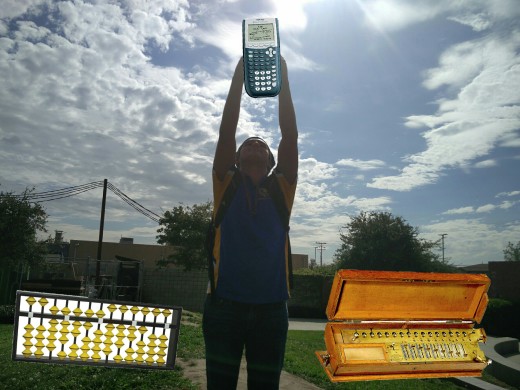
Grant Eichinger (’18) valiantly holds his precious TI-84 plus graphing calculator in the air. Photo illustration by Benjamin Minch.by Benjamin Minch, Staff Writer
Life is numbers. Everyday, you must calculate price, discounts, steps, calories, time, days of the week and all this can be a real hassle. This is the importance of a calculator: making everybody’s life a little bit easier. Many students at Fountain Valley High School feel that the calculator is one of the most important tool available to them for math, and many rely on the numbers on the screen to determine their success.
Before there was the calculator, there was no math. However, this didn’t last very long because the first calculator, the abacus, was invented in 2000 BC by the Egyptians. It was only a frame with rods embedded into it, with 10 beads on each rod. It was a marvel of its time; but unfortunately, this technology would never be improved on for over 3,600 years. The calculator had been forgotten.
In 1820, the calculator finally got an upgrade. Thomas de Colmar invented a calculator called the Arithmometer. It was a series of geared wheels that could add and subtract. This was the first viable counting machine for mass production, but many new upgrades to the calculator would soon be made.
Calculators then moved onto an electronic age, and very big and bulky calculators were produced to perform simple functions in the 1960’s. In 1970, the first pocket calculator was invented by the Japanese, and calculators only got better from there. In 1985, the first graphing calculator was invented, the Casio fx-7000g, and now calculators are readily available to the public. You can even get calculators at the 99 Cents Only store, an item that used to cost upwards of $100.
At Fountain Valley High School, students were asked: “How important is a calculator?” and responses most all of the responses were the same.
“You need calculators for everything in physics because nothing is a set value. Everything is either a random decimal or fraction and it would be impossible without a calculator,” said Nick Grogan (‘18).
“Math would be almost impossible without a calculator. It would be impossible to find sines, cosines and tangents. Without a calculator, good luck succeeding in math,” said Grant Eichinger (‘18).
The calculator is really an object of magic that our brains can’t comprehend. How it can graph functions in just seconds is truly amazing, but is often taken for granted. Students don’t realize that without it, math homework would take double to even triple the time. Out of all the students interviewed, most agreed that modern math without a calculator is nearly impossible. Calculators are the tools that keep us up to pace in this busy world with so many distractions and decisions. The calculator has truly left an everlasting impact on the world, and especially at schools that excel in math such as Fountain Valley High School.





